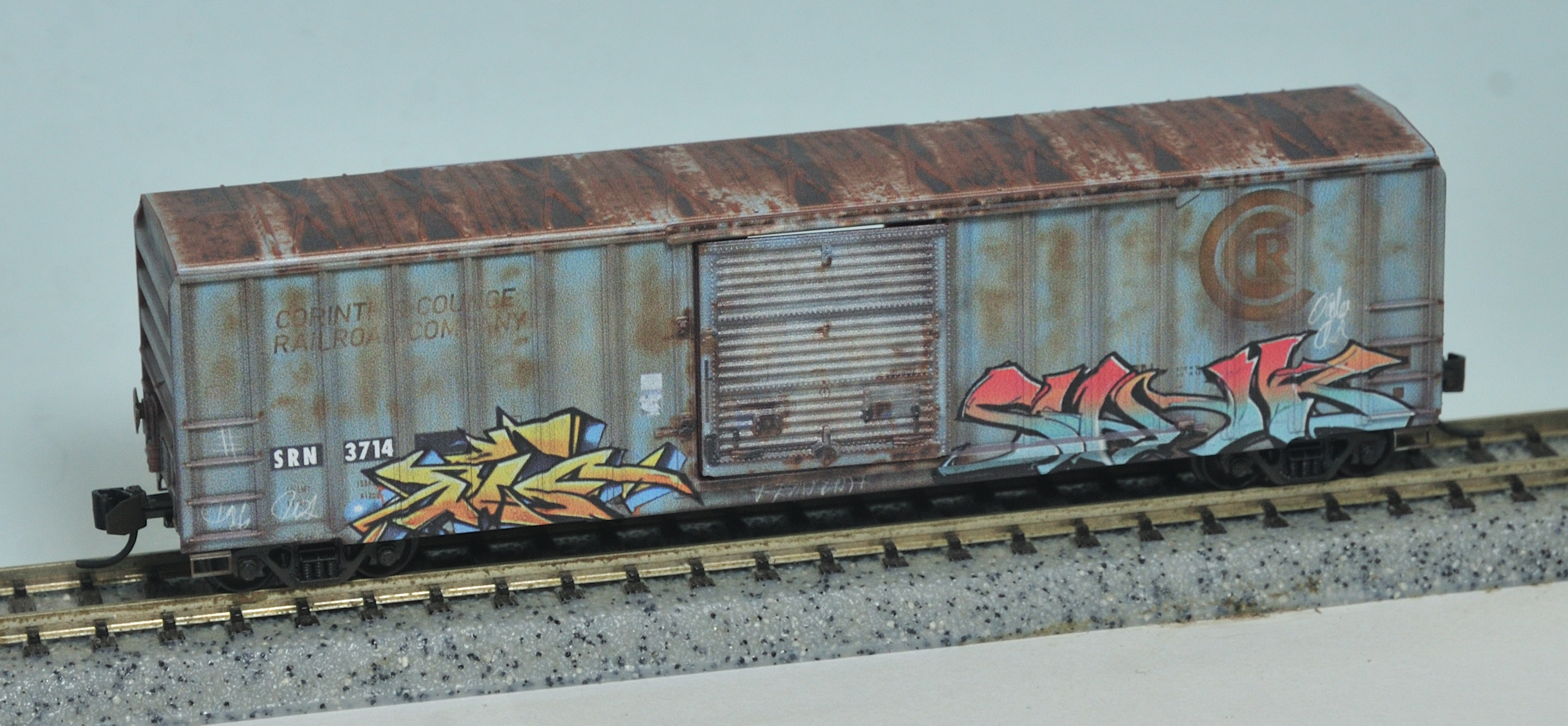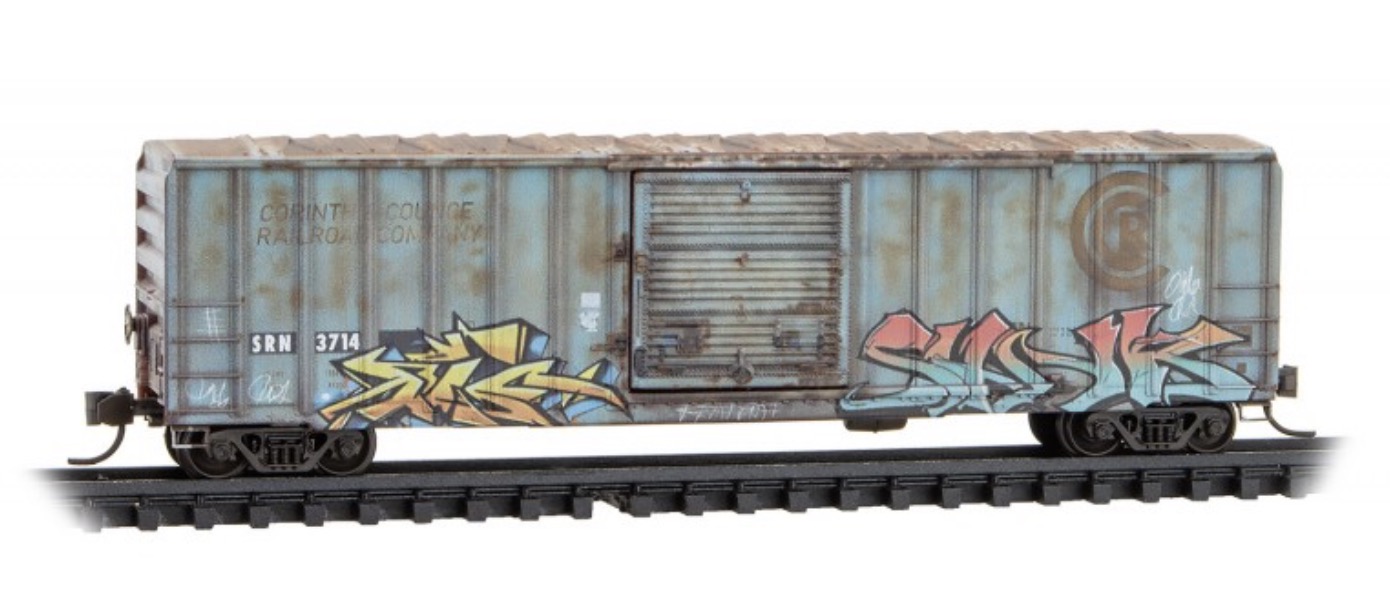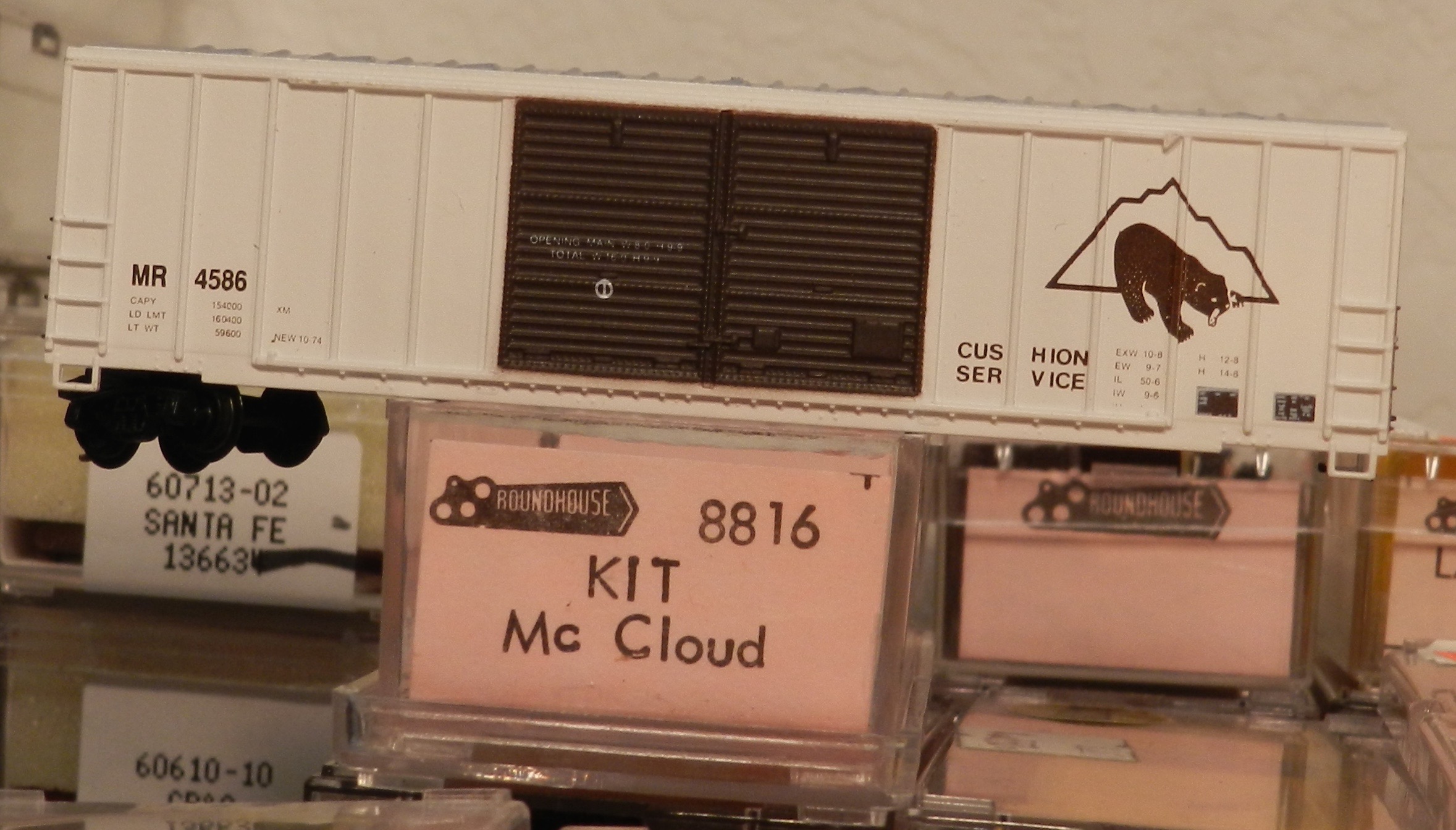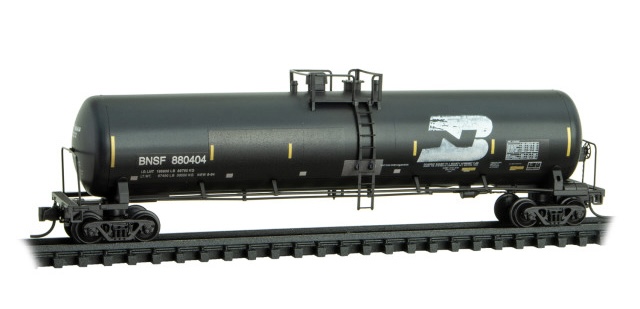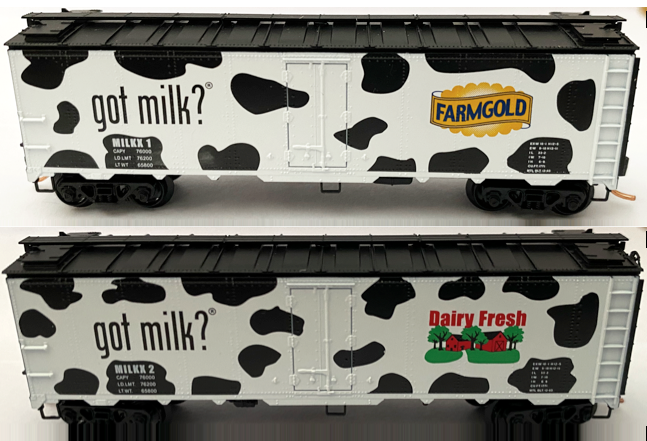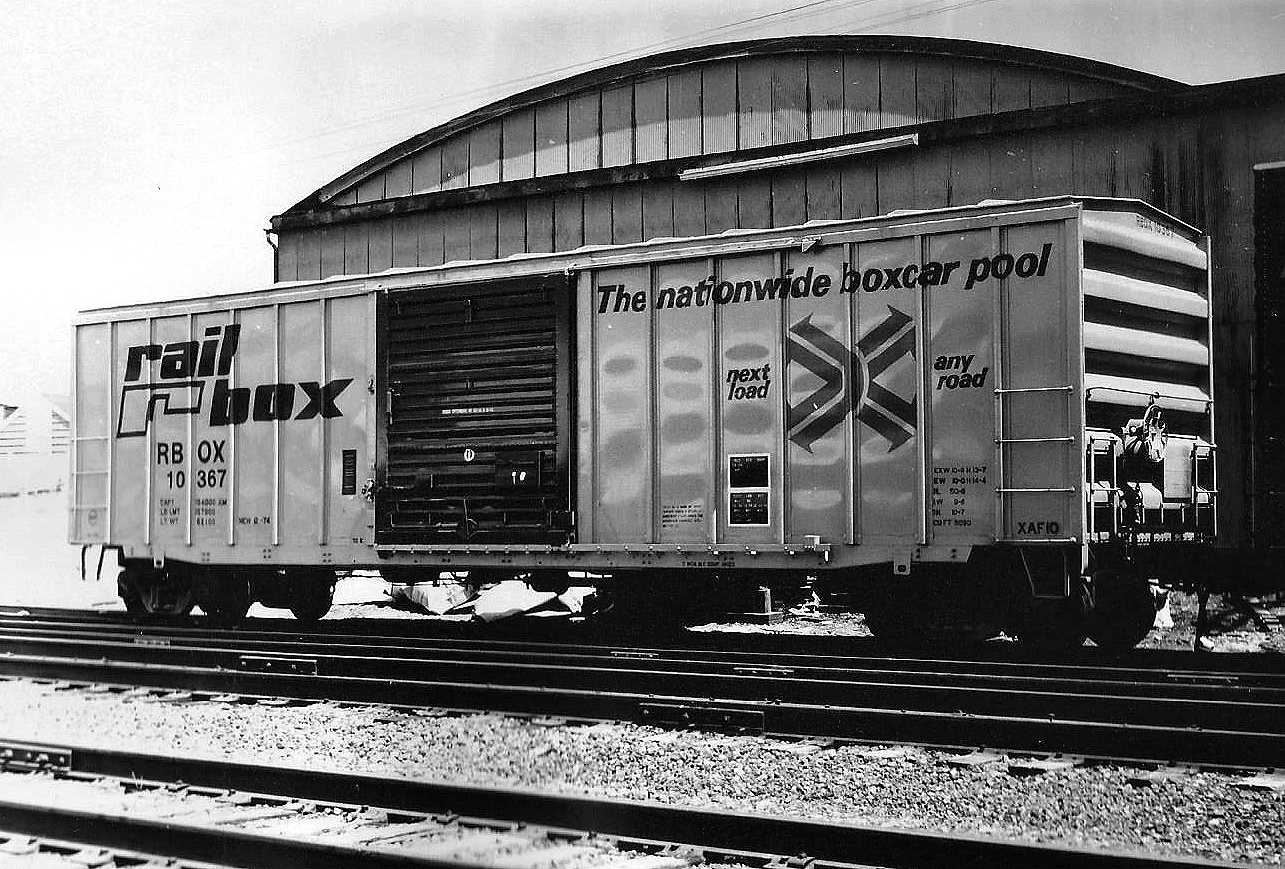Specific Item Information: This ex-Corinth & Counce boxcar with Barber Roller Bearing trucks was obtained by Sabine River & Northern Railroad in the 2000s. SRN is a short line in Texas that primarily hauls pulpwood and finished paper products from mills and finishing plants. SRN has connections with both BNSF and Union Pacific.
Series Information: Series launched in April of 2024.
Model Information: This model was first produced by Kadee in February of 1981. It is a model of a 50 Foot Steel Rib-Side Single Sliding Door Boxcar. Specifically, this Micro-Trains body style models the FMC 50' 5077 Single Sliding Door prototype. It is also used by Micro-Trains to model Pullman Standard 50' boxcars. Hence on some releases, this car is labeled as a Pullman Standard and in other cases it is labeled as an FMC boxcar, and it also is frequently labeled as a '50' Rib Side Box Car[sic]' with no mention of prototype whatsoever. It appears to be closest to the FMC 5077 boxcar prototype (from the 1970s) in any event. These models can appear with any one of multiple different sliding door types. The doors for this model are operating ones (cool!).
Prototype History: In the 1970's with the growth of the Per Diem business model, FMC produced a series of 50 foot box cars in different configurations. The single-sliding-door configuration is one of the best known and used widely by many different railroads. These cars were produced using the Gunderson metal works which FMC had acquired in 1965. In late 1975, FMC began producing a 5,077-cubic-foot Plate B box car for IPD and Railbox service. FMC's 5077s have seven panels to either side of the 10-foot door, an X-panel roof, and non-terminating ends that are slightly different from those used on FMC's earlier cars. Note how the sidesill is notched all the way back to the bolsters, a key feature of FMC's mature design.
The main difference between the 5077 cu. ft cars built by FMC vs the 5277-5347 cu. ft cars built by the same manufacturers is the overall height of the car, the smaller 5077 cars were Plate B while the larger 5277-5347 cars were Plate C. Over 4,300 cars were produced from 1975-1979 by FMC's Portland, Oregon plant. The cars were delivered in numerous colorful shortline paint schemes, as well as the nationwide car pool fleet of Railbox. Many secondhand cars were later seen in Class 1 railroads and large leasing company fleets under additional shortline reporting marks.
The main difference between the 5077 cu. ft cars built by FMC vs the 5277-5347 cu. ft cars built by the same manufacturers is the overall height of the car, the smaller 5077 cars were Plate B while the larger 5277-5347 cars were Plate C. Over 4,300 cars were produced from 1975-1979 by FMC's Portland, Oregon plant. The cars were delivered in numerous colorful shortline paint schemes, as well as the nationwide car pool fleet of Railbox. Many secondhand cars were later seen in Class 1 railroads and large leasing company fleets under additional shortline reporting marks.
Road Name History: 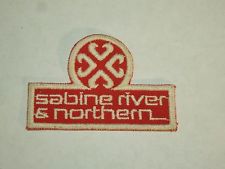 SABINE RIVER AND NORTHERN RAILROAD. The Sabine River and Northern Railroad Company was chartered on April 20, 1965. to provide rail service to the Owens-Illinois, Incorporated, linerboard mill subsequently constructed near Mulford in northeastern Orange County. The railroad was projected to run from Bessmay on the Gulf, Colorado and Santa Fe Railway to a connection with the Southern Pacific in Orange County two miles west of the Louisiana border. The capital stock was $1,000,000, and the principal place of business was four miles south of Deweyville in Orange County. Construction of the Sabine River and Northern began at Echo in late 1965, and the segment between Echo and Mulford opened on April 19, 1966. Operation of the 31½ miles began on August 17, 1967, when service was extended to Mauriceville and Bessmay.
SABINE RIVER AND NORTHERN RAILROAD. The Sabine River and Northern Railroad Company was chartered on April 20, 1965. to provide rail service to the Owens-Illinois, Incorporated, linerboard mill subsequently constructed near Mulford in northeastern Orange County. The railroad was projected to run from Bessmay on the Gulf, Colorado and Santa Fe Railway to a connection with the Southern Pacific in Orange County two miles west of the Louisiana border. The capital stock was $1,000,000, and the principal place of business was four miles south of Deweyville in Orange County. Construction of the Sabine River and Northern began at Echo in late 1965, and the segment between Echo and Mulford opened on April 19, 1966. Operation of the 31½ miles began on August 17, 1967, when service was extended to Mauriceville and Bessmay.
The mileage includes 6,800 feet of trackage rights over the Missouri Pacific Railroad at Mauriceville. Between Echo and Mauriceville the Sabine River and Northern constructed a completely new railroad. North of Mauriceville, however, the company laid its track on the abandoned grade of a Missouri Pacific branch line that once ran to Bessmay and Newton. In 1972 the railroad owned five diesel units and one car and reported a net income of $172,000. The Mulford mill and the railroad were acquired by a subsidiary of what is now Temple-Inland, Incorporated, in 1986. Other Temple-Inland facilities in southeast Texas include a Temple-Inland Forest Products Corporation sawmill at Buna and a bleached paperboard mill at Evadale.
The Buna sawmill was served by the Sabine River and Northern. In order to better integrate the three mills in the area and to provide additional outlets for the production of the Evadale facility, the railroad began work on a line to Evadale in June 1988. This eight mile branch, which leaves the main line eleven miles north of Mauriceville, opened on July 19, 1990. The Sabine River and Northern connects with all four major railroads serving southeastern Texas, the Southern Pacific Transportation at Echo, the Kansas City Southern Railway at Lemonville, the Missouri Pacific at Mauriceville, and the Atchison, Topeka and Santa Fe Railway at Bessmay and Evadale. The Sabine River and Northern transports wood chips from Buna and other Temple-Inland East Texas products bound for Mulford as well as inbound chemicals and other raw materials required for the manufacture of paper. Outbound freight includes finished lumber and paper products. From the Texas State Historical Association

The mileage includes 6,800 feet of trackage rights over the Missouri Pacific Railroad at Mauriceville. Between Echo and Mauriceville the Sabine River and Northern constructed a completely new railroad. North of Mauriceville, however, the company laid its track on the abandoned grade of a Missouri Pacific branch line that once ran to Bessmay and Newton. In 1972 the railroad owned five diesel units and one car and reported a net income of $172,000. The Mulford mill and the railroad were acquired by a subsidiary of what is now Temple-Inland, Incorporated, in 1986. Other Temple-Inland facilities in southeast Texas include a Temple-Inland Forest Products Corporation sawmill at Buna and a bleached paperboard mill at Evadale.
The Buna sawmill was served by the Sabine River and Northern. In order to better integrate the three mills in the area and to provide additional outlets for the production of the Evadale facility, the railroad began work on a line to Evadale in June 1988. This eight mile branch, which leaves the main line eleven miles north of Mauriceville, opened on July 19, 1990. The Sabine River and Northern connects with all four major railroads serving southeastern Texas, the Southern Pacific Transportation at Echo, the Kansas City Southern Railway at Lemonville, the Missouri Pacific at Mauriceville, and the Atchison, Topeka and Santa Fe Railway at Bessmay and Evadale. The Sabine River and Northern transports wood chips from Buna and other Temple-Inland East Texas products bound for Mulford as well as inbound chemicals and other raw materials required for the manufacture of paper. Outbound freight includes finished lumber and paper products. From the Texas State Historical Association
Brand/Importer Information: Micro-Trains is the brand name used by both Kadee Quality Products and Micro-Trains Line. For a history of the relationship between the brand and the two companies, please consult our Micro-Trains Collector's Guide.
Manufacturer Information:  Micro-Trains Line split off from Kadee Quality Products in 1990. Kadee Quality Products originally got involved in N-Scale by producing a scaled-down version of their successful HO Magne-Matic knuckle coupler system. This coupler was superior to the ubiquitous 'Rapido' style coupler due to two primary factors: superior realistic appearance and the ability to automatically uncouple when stopped over a magnet embedded in a section of track. The success of these couplers in N-Scale quickly translated to the production of trucks, wheels and in 1972 a release of ready-to-run box cars.
Micro-Trains Line split off from Kadee Quality Products in 1990. Kadee Quality Products originally got involved in N-Scale by producing a scaled-down version of their successful HO Magne-Matic knuckle coupler system. This coupler was superior to the ubiquitous 'Rapido' style coupler due to two primary factors: superior realistic appearance and the ability to automatically uncouple when stopped over a magnet embedded in a section of track. The success of these couplers in N-Scale quickly translated to the production of trucks, wheels and in 1972 a release of ready-to-run box cars.
Micro-Trains Line Co. split off from Kadee in 1990 to form a completely independent company. For this reason, products from this company can appear with labels from both enterprises. Due to the nature of production idiosyncrasies and various random factors, the rolling stock from Micro-Trains can have all sorts of interesting variations in both their packaging as well as the products themselves. When acquiring an MTL product it is very important to understand these important production variations that can greatly enhance (or decrease) the value of your purchase.
Please consult our Micro-Trains Collector's Guide

Micro-Trains Line Co. split off from Kadee in 1990 to form a completely independent company. For this reason, products from this company can appear with labels from both enterprises. Due to the nature of production idiosyncrasies and various random factors, the rolling stock from Micro-Trains can have all sorts of interesting variations in both their packaging as well as the products themselves. When acquiring an MTL product it is very important to understand these important production variations that can greatly enhance (or decrease) the value of your purchase.
Please consult our Micro-Trains Collector's Guide
Item created by: CNW400 on 2024-03-30 15:19:52. Last edited by George on 2024-09-12 12:13:49
If you see errors or missing data in this entry, please feel free to log in and edit it. Anyone with a Gmail account can log in instantly.
If you see errors or missing data in this entry, please feel free to log in and edit it. Anyone with a Gmail account can log in instantly.


